虚拟语气在if句的用法[1]
as if 虚拟语气的用法(一)
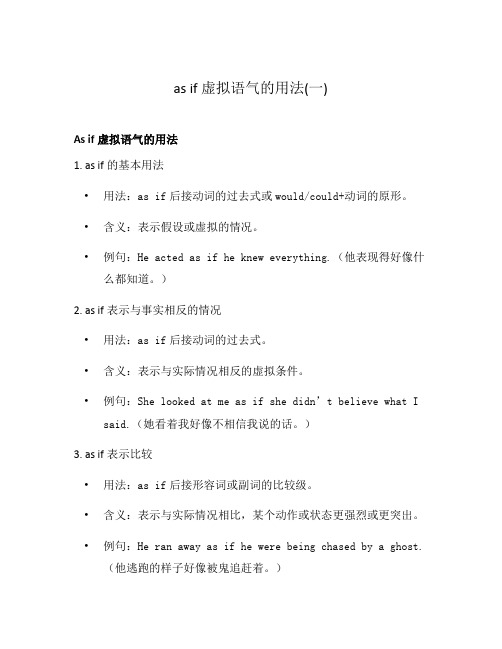
as if 虚拟语气的用法(一)As if虚拟语气的用法1. as if的基本用法•用法:as if后接动词的过去式或would/could+动词的原形。
•含义:表示假设或虚拟的情况。
•例句:He acted as if he knew everything.(他表现得好像什么都知道。
)2. as if表示与事实相反的情况•用法:as if后接动词的过去式。
•含义:表示与实际情况相反的虚拟条件。
•例句:She looked at me as if she didn’t believe what I said.(她看着我好像不相信我说的话。
)3. as if表示比较•用法:as if后接形容词或副词的比较级。
•含义:表示与实际情况相比,某个动作或状态更强烈或更突出。
•例句:He ran away as if he were being chased by a ghost.(他逃跑的样子好像被鬼追赶着。
)4. as if表示推测或揣测•用法:as if后接动词原形。
•含义:表示根据事实或情况的推测或猜测。
•例句:She talks about him as if she knows him very well.(她谈论他的样子好像非常了解他。
)5. as if与would/could连用•用法:as if后接would/could+动词的原形。
•含义:表示虚拟的动作或假设的情况。
•例句:He acted as if he would never give up.(他的表现好像永远不会放弃。
)6. as if的否定形式•用法:as if后加not,构成as if not。
•含义:表示与实际情况相反或不可能发生的虚拟情况。
•例句:He looked at me as if he were not afraid of anything.(他看着我好像一点也不害怕。
)7. as if的省略形式•用法:当主句和从句的主语一致时,可以省略as if。
if的虚拟语气用法
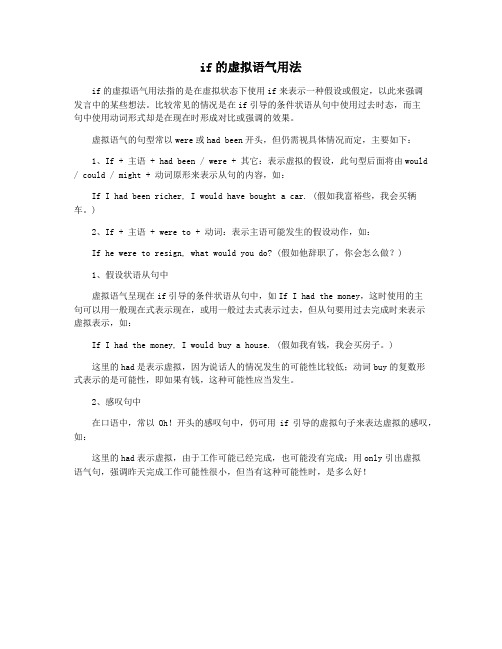
if的虚拟语气用法if的虚拟语气用法指的是在虚拟状态下使用if来表示一种假设或假定,以此来强调发言中的某些想法。
比较常见的情况是在if引导的条件状语从句中使用过去时态,而主句中使用动词形式却是在现在时形成对比或强调的效果。
虚拟语气的句型常以were或had been开头,但仍需视具体情况而定,主要如下:1、If + 主语 + had been / were + 其它:表示虚拟的假设,此句型后面将由would / could / might + 动词原形来表示从句的内容,如:If I had been richer, I would have bought a car. (假如我富裕些,我会买辆车。
)2、If + 主语 + were to + 动词:表示主语可能发生的假设动作,如:If he were to resign, what would you do? (假如他辞职了,你会怎么做?)1、假设状语从句中虚拟语气呈现在if引导的条件状语从句中,如If I had the money,这时使用的主句可以用一般现在式表示现在,或用一般过去式表示过去,但从句要用过去完成时来表示虚拟表示,如:If I had the money, I would buy a house. (假如我有钱,我会买房子。
)这里的had是表示虚拟,因为说话人的情况发生的可能性比较低;动词buy的复数形式表示的是可能性,即如果有钱,这种可能性应当发生。
2、感叹句中在口语中,常以Oh!开头的感叹句中,仍可用if引导的虚拟句子来表达虚拟的感叹,如:这里的had表示虚拟,由于工作可能已经完成,也可能没有完成;用only引出虚拟语气句,强调昨天完成工作可能性很小,但当有这种可能性时,是多么好!。
if的虚拟语气的用法例句
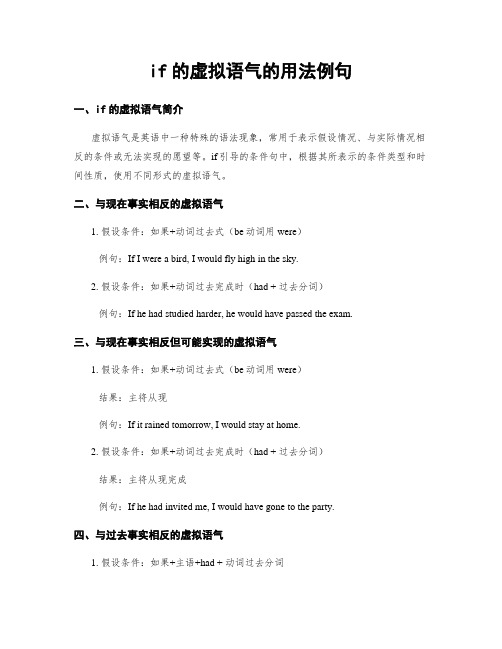
if的虚拟语气的用法例句一、if的虚拟语气简介虚拟语气是英语中一种特殊的语法现象,常用于表示假设情况、与实际情况相反的条件或无法实现的愿望等。
if引导的条件句中,根据其所表示的条件类型和时间性质,使用不同形式的虚拟语气。
二、与现在事实相反的虚拟语气1. 假设条件:如果+动词过去式(be动词用were)例句:If I were a bird, I would fly high in the sky.2. 假设条件:如果+动词过去完成时(had + 过去分词)例句:If he had studied harder, he would have passed the exam.三、与现在事实相反但可能实现的虚拟语气1. 假设条件:如果+动词过去式(be动词用were)结果:主将从现例句:If it rained tomorrow, I would stay at home.2. 假设条件:如果+动词过去完成时(had + 过去分词)结果:主将从现完成例句:If he had invited me, I would have gone to the party.四、与过去事实相反的虚拟语气1. 假设条件:如果+主语+had + 动词过去分词结果:主语+would/could/might + have + 过去分词例句:If I had known the truth, I would have made a different decision.2. 假设条件:如果+主语+had not +过去分词形式,结果也用一般过去时态例句:If we hadn't missed the train, we would have arrived on time.五、与将来事实相反的虚拟语气1. 假设条件:如果+动词过去式(be动词用were)结果:主将从现(应该+动词原形)例句:If they were here, they would help us.2. 假设条件:如果+should/were to/might/could/would + 动词原形结果:主将从现(应该+动词原形)例句:If he should call, please ask him to wait.六、虚拟语气中常用的连词和引导短语1. if: 引导条件状语从句,表示假设情况。
(完整版)if引导的条件句中的虚拟语气
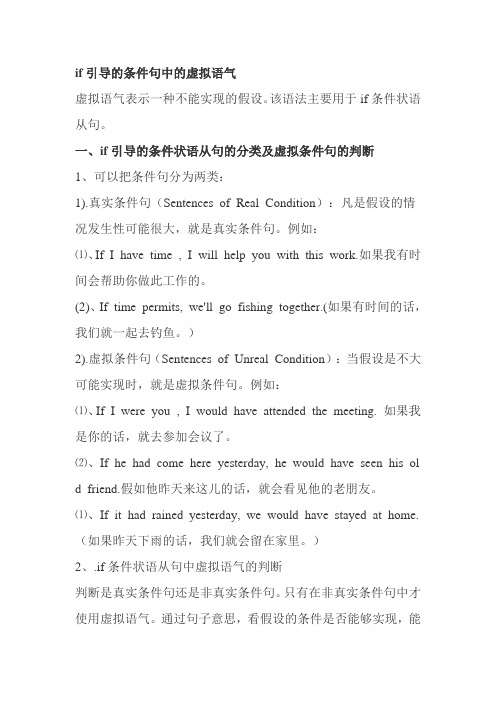
if引导的条件句中的虚拟语气虚拟语气表示一种不能实现的假设。
该语法主要用于if条件状语从句。
一、if引导的条件状语从句的分类及虚拟条件句的判断1、可以把条件句分为两类:1).真实条件句(Sentences of Real Condition):凡是假设的情况发生性可能很大,就是真实条件句。
例如:⑴、If I have time , I will help you with this work.如果我有时间会帮助你做此工作的。
(2)、If time permits, we'll go fishing together.(如果有时间的话,我们就一起去钓鱼。
)2).虚拟条件句(Sentences of Unreal Condition):当假设是不大可能实现时,就是虚拟条件句。
例如:⑴、If I were you , I would have attended the meeting. 如果我是你的话,就去参加会议了。
⑵、If he had come here yesterday, he would have seen his old friend.假如他昨天来这儿的话,就会看见他的老朋友。
⑴、If it had rained yesterday, we would have stayed at home.(如果昨天下雨的话,我们就会留在家里。
)2、.if条件状语从句中虚拟语气的判断判断是真实条件句还是非真实条件句。
只有在非真实条件句中才使用虚拟语气。
通过句子意思,看假设的条件是否能够实现,能够实现是真实条件句,不能使用虚拟语气;假设的条件不能实现则是非真实条件句,要用虚拟语气。
判断这个假设是与哪个事实相反。
通常有三种情况:①与过去事实相反。
②与现在事实相反。
③与将来事实可能相反。
3、“后退一步法”后退一步法是指在准确地判断了该句与哪一事实相反后,按虚拟语气的后退一步法处理从句谓语动词的时态。
if would 虚拟语气例句

if would虚拟语气例句虚拟语气是英语语法中一个重要的概念,用来表示与事实相反或假设的情况。
在英语中,虚拟语气的运用非常广泛,可用于表达假设、建议、愿望、要求等等。
掌握好虚拟语气的用法,有助于提升我们的英语表达能力。
下面是一些关于虚拟语气的例句,希望能对大家有所帮助:1.If I were you,I would study harder.(假设句)如果我是你,我会更努力地学习。
2.I wish I could fly like a bird.(愿望句)我希望我能像鸟一样飞翔。
3.If I had more time,I would go traveling.(假设句)如果我有更多时间,我会去旅行。
4.She suggested that he attend the meeting.(建议句)她建议他参加会议。
5.If she had arrived earlier,she wouldn't have missed the train.(假设句)如果她早点到,她就不会错过火车了。
6.They demanded that he apologize for his behavior.(要求句)他们要求他为自己的行为道歉。
7.If I won a million dollars,I would donate it to charity.(假设句)如果我赢得一百万美元,我会把它捐给慈善机构。
8.He acted as if he knew everything.(假设句)他表现得好像他什么都知道。
9.If I had known about the party,I would have gone.(假设句)如果我早知道有派对,我就会去的。
10.It's about time you finished your homework.(建议句)你应该早点完成作业了。
以上是一些关于虚拟语气的例句,通过阅读和学习这些例句,我们可以更好地理解虚拟语气的用法,并能够在实际应用中灵活运用。
if和will的用法虚拟语气

if和will的用法虚拟语气一、if和will的用法概述if和will都是英语中常用的虚拟语气形式,用来表示与实际情况相反或假设的情况。
它们有着各自独特的用法和含义,在句子中起到不同的作用。
二、if引导条件句时的用法1. 表示可能性如果真实情况下可能发生某事,可以使用if引导条件从句。
例如:If it rains tomorrow, we will stay at home.(如果明天下雨,我们就会呆在家里。
)这个句子表示,如果明天下雨这种可能性存在,那么我们将选择待在家里。
2. 表示假设当前提是无法满足或纯粹是个假设时,可以使用if引导条件从句。
例如:If I were you, I would study harder.(如果我是你,我会更加努力学习。
)在这个例子中,“我是你”这个前提显然是不可能实现的,所以我们使用了“were”而不是“was”。
3. 表示建议通过一个假设来为对方提出建议或提供帮助时,可以使用if引导条件从句。
例如:If you need any assistance, feel free to ask me for help.(如果你需要任何帮助,请随时向我寻求。
)在这个句子里,“如果你需要任何帮助”是一个假设条件,用来表示作者愿意提供帮助。
三、will引导虚拟条件句时的用法1. 表示说话人的意愿或意图当说话人通过虚拟语气表达自己对某事的意愿或意图时,可以使用will引导后面的从句。
例如:She asked me if I would help her with the project.(她问我是否愿意帮她完成这个项目。
)在这个例子中,“我愿意帮忙”正好符合了will的用法,表达出了说话人对于帮助的意愿。
2. 表示猜测或推测在一些情况下,使用will来表示根据某种迹象或判断得出某种猜测或推测。
例如:If he doesn't hurry up, he will miss the train.(如果他不赶紧,他会错过火车。
虚拟语气在if条件状语从句中的用法

错综条件句
虚拟条件句中,结果主句和条件从句的谓语动 作若不是同时发生时,虚拟语气的形式应作相 应的调整.这种条件句叫错综条件句.
①从句的动作与过去事实相反,而主句的动 作与现在或现在正在发生的事实不符.〔假如 过去... 现在就会... 过去和现在都是与实 际不符的 eg:
表示对将来情况的虚拟
▪ 从句:①if+主语+were to do
▪
②if+主语+should+do
▪
③if+主语+过去式〔be动词用were
▪ 主句:主语+should/would/might/could+动词原形
▪ 1.If he should come here tomorrow,I would talk to him.
▪ 如果他明天来这儿的话,我就跟他谈谈.〔事实:来的可能性很小,不可能
▪ 2.If there were a heavy snow next Sunday,we would not go
skating.
▪ 如果下周日下大雪,我们就不能去滑冰了.〔事实:下雪可能性很小,不可 能
▪ 3.If she were to be here next Monday,I would tell her about the
matter.
▪ 如果她下周一来这儿的话,我就会告诉她这件事的始末.〔事实:来的可 能性很小,不可能
表示对过去情况的虚拟
▪ 从句:If+主语+过去完成时 ▪ 主句:主语+should/would/might/could+have done ▪ 1. If I had got there earlier,I should/would have met her. 如果我早
英语中-if从句中的虚拟语气用法-经常用到的知识点!
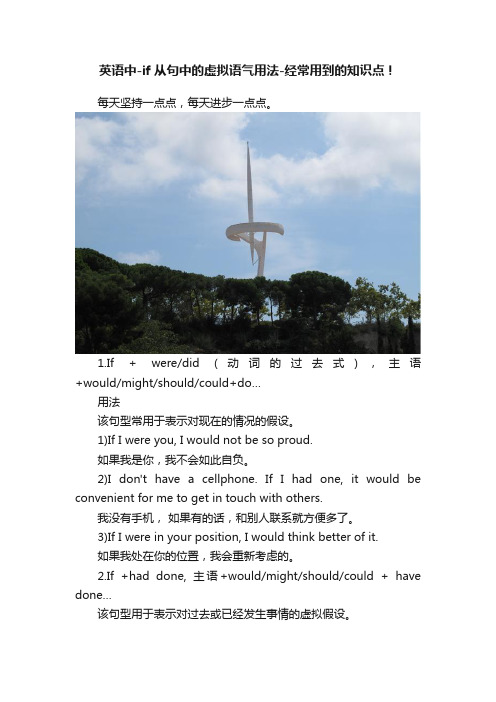
英语中-if从句中的虚拟语气用法-经常用到的知识点!每天坚持一点点,每天进步一点点。
1.If + were/did (动词的过去式),主语+would/might/should/could+do…用法该句型常用于表示对现在的情况的假设。
1)If I were you, I would not be so proud.如果我是你,我不会如此自负。
2)I don't have a cellphone. If I had one, it would be convenient for me to get in touch with others.我没有手机,如果有的话,和别人联系就方便多了。
3)If I were in your position, I would think better of it.如果我处在你的位置,我会重新考虑的。
2.If +had done, 主语+would/might/should/could + have done…该句型用于表示对过去或已经发生事情的虚拟假设。
1)What a pity it is that you didn't attend the concert yesterday! If you had attended the concert, you would have seen the famous singer.真遗憾昨天你没有去听音乐会!如果你去了,就能见到那位著名歌手了。
2)Anyone in this position would have done the same. If anyone had been in his position, he would have done the same. 任何处在他位置的人都会这样做的。
3.If + were/did/were to do/ should do, 主语+ would/might/should/could +do…该句型常用于表示对将来的假设。
- 1、下载文档前请自行甄别文档内容的完整性,平台不提供额外的编辑、内容补充、找答案等附加服务。
- 2、"仅部分预览"的文档,不可在线预览部分如存在完整性等问题,可反馈申请退款(可完整预览的文档不适用该条件!)。
- 3、如文档侵犯您的权益,请联系客服反馈,我们会尽快为您处理(人工客服工作时间:9:00-18:30)。
S: Hello!
O: Hello!
S: I’m a reporter from Handan NO.1 Middle School , I want to ask you some questions.
S:If you ……
O:……
1. If both your mother and wife fell into the river, who would you save first? And why?
当从句中有 were, had 或 should 时,可省略if , 而把它们放在句首。
If I were to meet him, I should inform him. Were I to meet him tomorrow,…
If he should fail in the experiment this time, he would try again. Should he fail in the experiment… If you had come a few minutes earlier, you would have met him. Had you come a few….
If I _h_a_d_a boat, I_w_o_u_l_dgo out on the ocean. And if I _h_a_d_ a pony, I_w_o_u_l_d_ride him on my boat. And we could all together. Go out on the ocean. Mboeatu.pon my pony on my
the future fact
2. Gaokao is coming tomorrow. I don’t like it.
If there __w__er_e_/s_h_o_u_ld__b_e__ (be) no exam tomorrow, I _w_o_u_l_d_s_e_e__ (see) a movie.
did / were
对将来事 实的假设
should do
were to do
would should + do sth could might
Practice3
the future fact
1. It is predicted that it is sunny tomorrow.
If it _s_h_o_u_ld__ra_i_n_/w__er_e_t_o_r_a_i_n_/r_a_in_e_d_(rain) tomorrow, we __w_o_u_ld__n_o_t _g_o(not go) out.
If I had taken the umbrella , now.
Homework
1. Choose a partner to practice the dialogue. 2. Finish the exercise on page 6 in your book.
对现在事 实的假设
did / were
would should could might
+ do sth
Practice1
the present fact
1. David is not a sculptor(雕刻家).
If he _w_e__re__(be), he _w_o__u_ld__m__a_k_e__(make) a sculpture for the exhibition.
If I had a lot of money,
I would__b_u_y__t_h_e__c__a_r_.
Discover1
Actually she is a girl .
1.If I were a boy, I could drink beers with the.
guys
Actually he is a poor singer.
Show Time
• If the president, Obama were to come to Handan NO.1 Middle School and you were a reporter , you should ask him some questions using the subjunctive mood.
If they had had enough rain last year, they would have gained good harvest.
Discover2
The fact is that in 2014 they didn’t work hard.
1.If they had worked hard in 2014 ,they would have passed the exam .
对将来事实的假设
2.If they played better next time , they would not fail again.
The fact is that it is also hard to happen
for Chinese football team
If sb_____(从句) Sb ______(主句)
这两种情况是对过去事实的假设
2. If they had had enough rain last year, they would have gained good harvest.
The fact is that they did not have enough rain last year.
If sb_____(从句) Sb ______(主句)
2.If I had a boat, I would go out on the ocean.
3.If I had a lot of money, I might buy the car.
Actually I am a poor teacher.
以上情况是对现在事实的假设
If sb_____(从句) Sb ______(主句)
当条件状语从句表示的行为和主句表示的行为 所发生的时间不一致时
1.如果你当时接受我的建议,现在你就会更好了。 If you had followed my advice, you would be better now. 2.如果我是你,我当时就接受他的建议了。 If I were you, I would have taken his advice.
1.如果我当时带着伞,我当时就不会被雨淋了。
对过去事实假设
对过去事实假设
I would not have been
If I had taken the umbrella , caught by the rain.
2.如果我当时带着伞,我现在就不会这么湿了。
对过去事实假设
对现在事实假设
I would not be so wet
2.If you hadn’t married your wife, what kind of girl would you have loved?
3.If you were to become our schoolmaster , what would you do? ………..
省略 if 的条件从句
the past fact
2.I didn’t see your sister at the meeting.
If she__h_a_d__c_o_m__e______ (come), she__w_o_u_l_d_h_a_v_e__m_e_t___ (meet) my brother.
If Robots were to control the world some day, there should be no friendship.
含蓄条件句
有时候假设的情况不以if引导的条件从句形式表 现出来,而是通过一个介词短语,连词或其他形 式表示。 如:without, but for, otherwise, or等
If we had not had your help, we could not have succeeded. = Without / But for your help, we could not have succeeded.
the present fact 2. We don’t know her address.
If we_k__n_e_w__ (know) it, we w__o_u_l_d__s_e_n_d_(send) her a big bunch of flowers.
2015年河北省高中学业水平测试
If they had worked hard in 2014, they would have passed the exam.
might
did / were
对将来事 实的假设
should do
were to do
would should + do sth could might
如果上天能够给我一个再来一次的机会, 我会对那个女孩子说三个字:我爱你。 如果非要在这份爱上加上一个期限,我希望是--一万年!
If the God _s_h_o_u__ld__/_w__e_re__t_o__g_i_v_e_/_g_a_v(egive) me another chance,I___w_o_u__ld__t_e_l_l_ the girl three words: I love her! (tell). If our love __h_a_d__t_o__ (have to) be set a time limit, I wish it _w_o__u_ld__b__e__ 10,000 years! (be)
